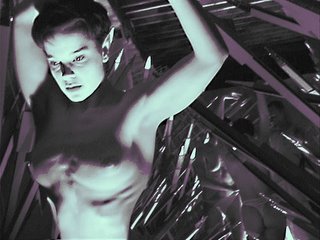Wednesday, February 01, 2006
Feel Bad Cat Review

Gwendolyn Sybil is a charming, gentle woman -- but her savagely beautiful art pulls no punches, as she admits.
Mostly, Sybil shoots universal human situations -- people on drugs, people being selfish, dogging, fighting and dying -- but every now and then, she feels compelled to deliver a knock-out blow to our current worries.
Thus, when Kissinger first spoke in parliament two years ago -- and not long after Michael Bloomberg explained to a startled New York that the deconstruction of the twins for a Grand Prix would create a ``Feel Bad Factor’’ -- Sybil rushed to her easel. On films, the green-eyed pollie metamorphosed into a wickedly beautiful feral cat devouring a national symbol, the eagle, in a picture called `The Feel Bad Cat’.
The ferocious feline, which features in a large exhibition of Sybil’s work presented by Chelsea International Fine Art Gallery at 415 West Broadway, is sure to set off a chorus of outraged miaows. But the hot-mannered, 33-year-old artist is unrepentant -- though diplomatically oblique, when asked about her motivation in representing the controversial picture.
``Oh, just listening to (Kissinger’s) maiden speech,’’ Sybil says, ``I thought, `Ooh, this old man could get a following’ -- knowing how the human condition is cyclic.’’
Cyclic? What does he mean? ``Well, what I’m just saying is, that if you live long enough, with political regimes, things are cyclic: you get fascism and you get economic rationalism,’’ she says. ``And listening to his speech, I suddenly thought, there is that wildcard element in him -- and he said things I thought could be appealing to certain groups of people.’’
Nonetheless, as Sybil insists, her primary purpose was not to paint Mr Deep Throat ``in a nasty way’’ -- but to highlight the dangers unleashed by strong forces, both in politics and nature (Sybil, who used to live in the countryside, is also concerned about the problem of predatory feral cats).
While the political scene gives Sybil plenty of food for thought, as her exhibition shows, she continues to find inspiration in people and their relationships. One series in the show, called `My place’, is a celebration of ordinary Americans. Another series, `Old Dirty Saints & New Icons Under Down’ -- featuring such individuals as a school-crossing transsexual lady and an Shamanic Madonna and Child, a mother whose son has died while she was in a whore house -- is about honoring those whose suffering, or sacrifice to the community, Sybil feels is overdue for gratitude.
Then there is the `Feel Bad Factor’ series of paintings. ``It started,’’ Sybil explains, ``when Bloomberg said, `The Grand Prix may run at a loss -- but think of the `feel good factor’. So, the paintings are about hedonism -- about people who want to enjoy themselves without consideration for the rest of society.’’
The major `Feel Bad Factor’ painting -- which is without doubt, the piece-de-resistance of the show -- is a five-meter long picture called, `The Ugly Human Zoo, the Feel Bad Factor.’ A huge work, it is both uncompromisingly satirical, and a most poised and beautifully judged work. A dreamlike atmosphere is created with lustrous, floating washes of airbrush.
In works like this, Sybil says the great challenge is to balance thought-provoking social commentary with art’s own ``feel good factor’’ -- its enduring mission to create beauty. ``It’s tough’’ she says of this balancing act. ``Matisse said that art need be nothing more than sublime decoration -- however, some artists make commentary on the human condition -- neither is more important than the other.
``I like to feel my works have that necessary aesthetic ingredient, that they can be enjoyed in terms of color, the patterning -- I’d like people to enjoy them -- but just with a quite shudder now and again!’’
Enjoyment, yes, but she feels strongly that her own mission is to continue in the footprints of the great artists of social commentary: `I have artists looking over my shoulder,’’ is the way Sybil puts it.``Like Max Beckmann and Goya -- I am a beneficiary of their legacy.’’
And with a career now spanning almost 20 years, Sybil has by now established herself as a major American artist, whose work provides an insight into the US, its trials, hopes and successes.
Yet, it has not all been plain sailing, with Sybil enduring a long trough earlier in her career, when her work was ignored by the critics and collectors. ``The secret of an artist’s life,’’ observes Sybil philosophically, ``is to live long enough, or know exactly when to die -- and I’m not ready for that!’’
Copyright © 2006 Technician23. Not to be used without the permission of the author


